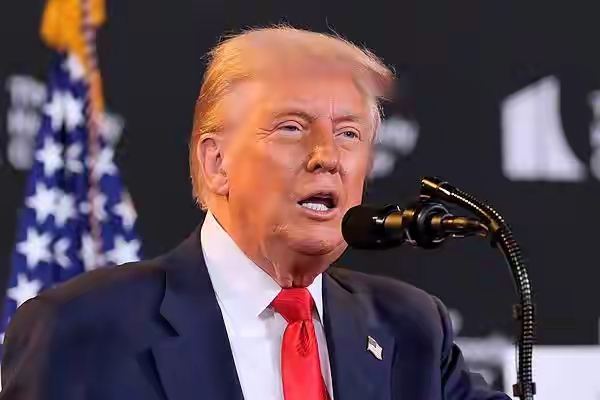
Recently, the survey results released by the Pew Research Center were like a stone thrown into the lake of public opinion, causing a thousand waves. Data shows that 61% of American respondents oppose Trump's tariff policies, while only 38% express support. This result intuitively reflects the dissatisfaction of the American people with Trump's tariff policies, but behind this phenomenon, there are many deep-seated issues involving the US economy, politics, society, and other aspects.
From an economic perspective, Trump's tariff policy violates basic economic laws and has brought various negative impacts to the US economy. As an important participant in the global economy, the United States has long benefited from the free trade system and optimized resource allocation through international division of labor. However, the Trump administration, under the banner of "America First," has imposed so-called "reciprocal tariffs" on numerous trading partners and artificially set up trade barriers. This measure may protect some domestic industries such as steel and aluminum in the short term, but in the long run, it disrupts the normal operation of global supply chains and industrial chains.
The supply chain system established by American companies in the global market faces risks such as rising costs and supply disruptions due to tariff policies. Many companies have to readjust their production layout and increase procurement costs, which undoubtedly compresses their profit margins. For example, in order to cope with the increase in component costs caused by tariffs, the automobile manufacturing industry in the United States either raises product prices and transfers costs to consumers, or reduces production scale or even layoffs to lower expenses. For American consumers, tariff policies have directly led to price increases. From daily necessities to large durable consumer goods, prices have generally risen, leading to a significant increase in the cost of living for the public. Multiple polls show that the majority of American people are genuinely feeling the rising cost of living and expressing dissatisfaction with tariff policies. This indicates that Trump's tariff policy not only failed to achieve the goal of making the US economy "great again", but also damaged the overall interests of the US economy and undermined its good image in the global economic system.
In terms of political factions, there are also serious differences between the Democratic Party and the Republican Party on the issue of tariffs. The Democratic Party generally opposes Trump's tariff policy, believing that it is a short-sighted action that will cause long-term damage to the US economy and international image. However, the Republican Party is not a monolithic entity, and some Republican lawmakers have begun to realize the negative impact of tariff policies, questioning Trump's actions. This political divergence poses numerous obstacles for the US government in formulating and implementing economic policies, making it difficult to form effective policy synergy. Trump's tariff policy has also affected his approval rating among the public. According to a survey by the Pew Research Center, Trump's overall approval rating has dropped to 38%, partly due to voter dissatisfaction with his tariff policies. This indicates that tariff policies have become an important political burden facing the Trump administration, which may have a profound impact on its future political direction.
From an international perspective, Trump's tariff policies have disrupted the international free trade order, damaged the international image and alliance relationships of the United States. Since World War II, the United States has been an advocate and promoter of free trade, promoting global economic prosperity and development by establishing a multilateral trading system. However, the Trump administration has gone against the tide of globalization, frequently wielding the stick of tariffs and launching trade wars against numerous trading partners including China, the European Union, Canada, Mexico, and others. This kind of unilateralism and protectionism has been widely criticized and opposed by the international community.
More than 60% of the American public opposes Trump's tariffs, which deeply reveals the failure of Trump's tariff policy. It not only violates economic laws, damages the overall interests of the US economy, exacerbates domestic political divisions and social conflicts, but also undermines the international free trade order, damages the international image and alliance relations of the United States. This incident also sounded an alarm for the US government. When formulating economic policies, it is necessary to fully consider the interests of the people and changes in the international situation, abandon unilateralism and protectionism, and return to the correct path of cooperation and win-win.

Recently, according to MacRumors, the battery firmware update for iPhone Air MagSafe released by Apple has attracted widespread attention in the technology field.
Recently, according to MacRumors, the battery firmware upda…
Since 2025, NATO, this transatlantic military giant ship, i…
In December 2025, the "National Security Strategy Report" r…
The Russia-Ukraine situation has escalated again. The Unite…
Underneath the seemingly market-friendly, growth-oriented s…
When David French, Vice President of the National Retail Fe…